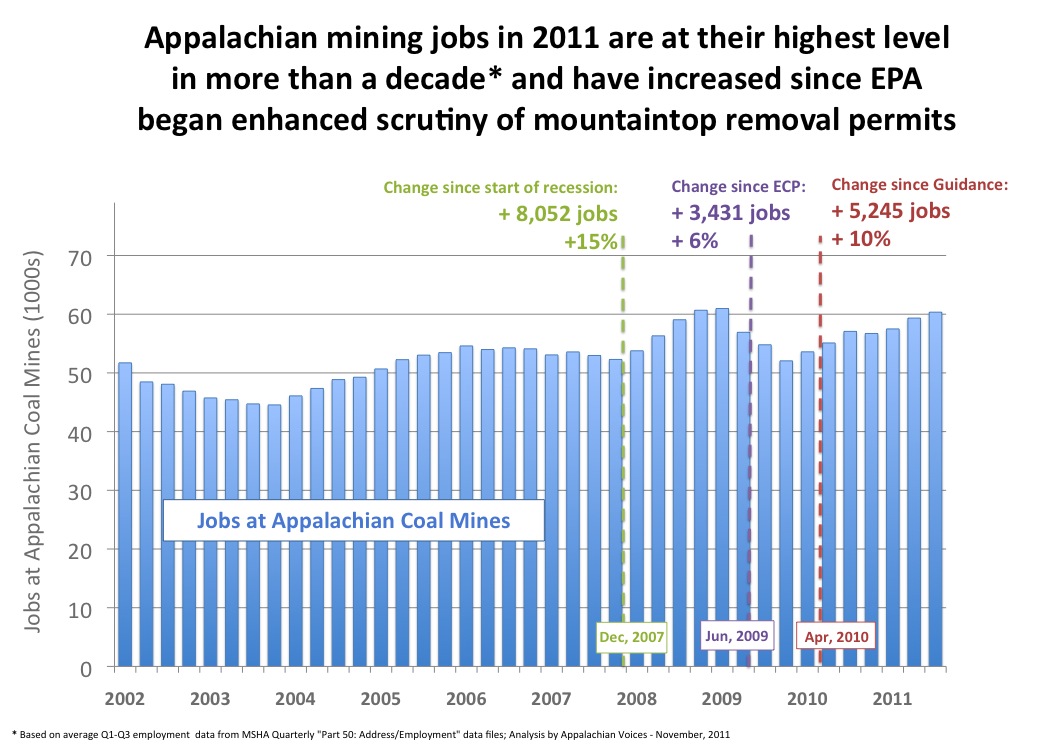Front Porch Blog
Appalachian Voices issued the following press release today.
EMPLOYMENT AT APPALACHIAN COAL MINES HITS 14-YEAR HIGH
Increased federal oversight of mountaintop removal coal mining corresponds with jobs increase, data shows
BOONE, N.C. – House Republicans continue to claim that federal oversight of mountaintop removal mining in Appalachia threatens domestic coal production and coal mining jobs in Appalachia, but new government data points to an opposite trend.
Data recently released by the Mine Safety and Health Administration show that the number of jobs at Appalachian coal mines in the first three quarters of 2011 is at its highest level since 1997. In contrast to previous predictions by coal industry supporters, the number of miners in Appalachia has increased by six percent since the Obama Administration announced plans to strengthen the U.S. Environmental Protection Agency’s scrutiny of mountaintop removal permits in June 2009.
Since the April 2010 issuance of an interim guidance on surface mine permitting in Appalachia by the EPA, the number of Appalachian miners has grown by 10 percent.
“What these data show is that strengthened enforcement of mine safety and environmental rules is creating jobs in Appalachia, not destroying them” said Dr. Matt Wasson, program director for regional environmental organization Appalachian Voices. “The opposition of coal companies to any and all regulations to protect the safety of workers and communities near their mines is really about profits — specifically, that they will be forced to spend more on workers at the expense of shareholder dividends.”
On Friday Nov. 18, House Republicans held the 15th House hearing this year aimed at promoting the idea that government regulation of surface mining leads to fewer mining jobs. The Subcommittee on Energy and Mineral Resources hearing involved legislation introduced by Representative Bill Johnson (R-OH) called the “Coal Miner Employment and Domestic Energy Infrastructure Protection Act.” Johnson’s bill would stop the federal Office of Surface Mining Reclamation and Enforcement from rewriting the federal stream buffer zone rule. But the bill would also greatly restrict OSMRE’s ability to regulate coal mines by prohibiting the agency from taking any actions that would reduce coal mine employment, reduce the amount of coal available for mining, consumption, or export, or designate an area as unsuitable for surface mining techniques such as mountaintop removal.
Some members of Congress have claimed that deregulation of coal mining is necessary to increase domestic coal production. But, according to Federal Reserve data released Nov. 17, the capacity of active and permitted coal mines is the highest it has been in 25 years. At the same time, the utilization of coal mine capacity thus far in 2011 is the lowest it has been in 25 years.
“The idea of a ‘Permitorium’ on coal mine permitting that House Republicans are pushing out is completely and demonstrably false,” said Wasson. “So is the idea that coal production in the U.S. is constrained by permits in any way. It’s entirely constrained by demand for coal.”
Mountaintop removal is a destructive form of surface mining that removes the tops of mountains to access thin seams of coal. Much of the remaining rubble is dumped in adjacent valleys, burying and poisoning valuable headwater streams with what is called a “valley fill.”

Appalachian Mine Jobs 2002 - 2011Q3
View more supporting data here:
https://appvoices.org/resources/Coal_Jobs_Supporting_Data.pdf
PREVIOUS
NEXT
Related News

Leave a comment
Your email address will not be published. Required fields are marked *

Is it a surprise to anyone that the coal industry lies about jobs and MTR are now exposed? This industry is focused on one thing… maximizing profits for coal companies (and the people and environment be damned.) Their claim is that surface mining is cheaper… yes, possibly because their labor costs are less? But at least now their more jobs claim is debunked. As long as we continue to be in bed with coal at least our hard working deep miners are starting to realize the benefits they deserve. The message for the future to all coal concerns, owners, workers, and politicians must be, FIND ANOTHER WAY.